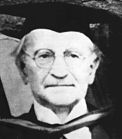Jan Lukasiewicz (1878 - 1956)

Jan Lukasiewicz (pronounced Wu-cash-ay-vich) was born on December 21st, 1878 in the city of Lwow in Poland. He was one of several notable mathematicians specializing in logic during the first part of the twentieth century.
At the time of his birth, Poland was under Austrian rule, although Lwow later became part of the Soviet Union. His father was a captain in the Austrian army but at home they spoke Polish and were practising Roman Catholics. As a young man, Lukasiewicz studied mathematics and philosophy at the local University and was awarded a doctorate in 1902. He continued at the University of Lwow until 1915 when he accepted a lectureship at the University of Warsaw, which was under German occupation at the time. Between the wars he was the Polish Minister of Education and Dean of the School of Philosophy, also filling the post of Rector of the University for two terms. While at Warsaw he published some eighty articles and papers on psychology, mathematics and philosophy.
Like many in Poland, Lukasiewicz and his wife Regina suffered greatly during the Second World War. His house was burned, with the loss of his library and manuscripts, and he found it impossible to continue working. He started to give lectures at the underground university and also helped govern the city under German occupation. Friends in Switzerland and Germany helped him escape from Poland shortly before the abortive uprising of 1944. He was in hiding in Munster, Germany, when it was liberated by US troops in April, 1945. He then moved, via Belgium, to Dublin where he accepted the Chair of Logic at the Royal Irish Academy and was made a member of the Institute of Advanced Studies. He was able to resume his studies and publication and remained in Dublin until his death on February 13th, 1956.
By 1917, Lukasiewicz had developed the idea of a three-valued propositional calculus (true/false/don't know). A by-product of this approach was the now widely used idea of a "truth table" by which all the possible inputs and outputs of a logic system can be tabulated. Another major contribution was his development of "Polish Notation" which simplifies the expression of logical and arithmetic relationships by eliminating parentheses and other unnecessary symbols. This was the basis of Reverse Polish Notation (RPN) which is familiar to users of calculators manufactured by Hewlett-Packard and others. Lukasiewicz survived long enough to witness the arrival of the computer era and the application of some of his ideas. But he did not feel that any practical justification for mathematical and philosophical study was necessary: "As art grew out of the craving for beauty, science was created by the urge for knowledge". He regarded the sayings "art for art's sake" and "science for science's sake" as equally valid.